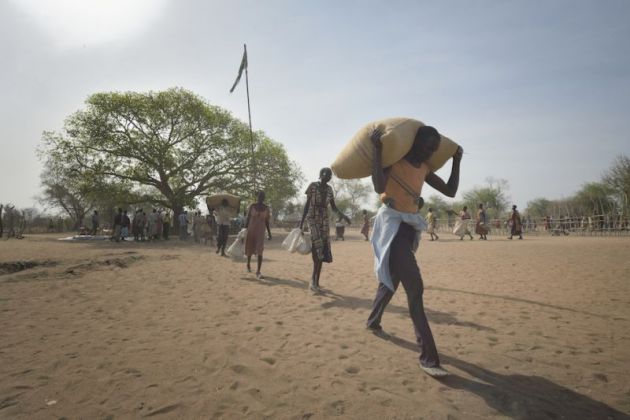G7 must address famine, say world churches and church aid groups

Global Christian organizations and churches are issuing a plea to the Group of Seven nations meeting in Italy to do all they can save the lives of 20 million people who face famine in Yemen, Somalia, South Sudan and Nigeria.
"Not nearly enough is being done to save the lives of the 20 million people who face famine....Among them are 1.4 million children, who are at imminent risk of death unless aid reaches them immediately," the group in a statement released by the group.
The Group of Seven developed nations, known as the G7 is a group consisting of Canada, France, Germany, Italy, Japan, the United Kingdom, and the United States. The European Union is also represented within the G7.
The 43rd G7 summit will be held on May 26–27, 2017 in Taormina, Sicily, Italy.
"In this day and age, famine cannot be tolerated, not just because every human being is valued in God's sight and has the right to eat but also because starvation
"It is the moral duty of wealthy nations to do all they can to provide life-saving funding and assistance and to work to end the underlying conditions that drive starvation: conflict, poor governance and climate change,"
The signatories of the plea include the ACT Alliance, Caritas in Veritate International-CiVI, Lutheran World Federation, The Salvation Army, World Council of Churches, World Evangelical Alliance and World Vision International.
They noted that on Sunday, May 21, more than one billion Christians were called to take part in a Global Day of Prayer to End Famine.
"We as signatories helped lead that global event because we believe that this crisis demands our prayers and that governments, society and people of faith must act," they said.
WORSENING HUNGER
The current crisis is happening in a backdrop of worsening hunger and the number of people needing food assistance has risen by 35 per cent in the last year, from 80 to 108 million people.
"This appalling statistic flies in the face of global commitments to end poverty and hunger by 2030 and suggests that while things are improving for the vast majority of the world, things are worsening for the already worst off.
"Humanitarian organizations - and our church members on the ground - are warning of catastrophe.
"In East Africa hundreds of thousands of people are now on the move, fleeing starvation and conflict or displaced across borders into hardscrabble settlements. Uganda now hosts the world's largest refugee camp - Bidi Bidi, with more than 270,000 people.
"Every day thousands more South Sudanese arrive in Uganda, among them hundreds of unaccompanied children whose parents have been lost or killed. Food aid is desperately short."
They said that in Somalia, hundreds of thousands have fled the dry lands where drought has destroyed whole herds of livestock and left villages with nothing to stay for.
Aid workers report of mothers losing their children to hunger and thirst on the long trek to find food and water while cholera, diarrhea and other diseases are also killing children, their weakened bodies unable to cope with what otherwise is treatable.
"They and their families are dying silently in remote villages, on the march to find help, or trapped in conflict kill zones, where they are subject to bombings, kidnapping, rape and violence. Children are paying a particularly heavy price," said the message to the G7.
"The last time that the world heard of famine was in 2011, when 260,000 Somalis died - half of them children. The situation is worse now.
!The UN says it has not seen a humanitarian crisis of this scale since 1945. Even though we know the trajectory of this crisis, the response is far too slow. Why is it that we only respond when death is staring us in the face?"